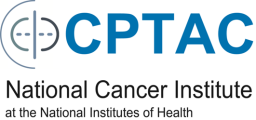
The National Cancer Institute’s Clinical Proteomic Tumor Analysis Consortium (CPTAC) is a national effort to accelerate the understanding of the molecular basis of cancer through the application of large-scale proteome and genome analysis, or proteogenomics.
Program Description
CPTAC is a comprehensive and coordinated effort to accelerate the understanding of the molecular basis of cancer through the application of robust, quantitative, proteomic technologies and workflows. The overarching goal of CPTAC is to improve our ability to diagnose, treat and prevent cancer. To achieve this goal in a scientifically rigorous manner, the NCI launched CPTAC to systematically identify proteins that derive from alterations in cancer genomes and related biological processes, and provide this data with accompanying assays and protocols to the public.
CPTAC has provided the Genomic Data Commons (GDC) with genomic data from a total of 1500+ cancer patients with diverse disease types including Endometrial, Renal, Lung Adenocarcinoma and Squamous Cell Carcinoma, Breast, Colon, Ovarian, Brain, Head and Neck, and Pancreatic cancers. The GDC harmonized DNA sequences from CPTAC whole genome sequencing (WGS), whole exomes sequencing (WXS), and RNA sequences with the GRCh38 reference genome using GDC DNA-Seq Analysis Pipelines and mRNA Analysis Pipelines, respectively. The CPTAC harmonized genomic data is available in the GDC Data Portal. CPTAC makes proteomic data that are processed through the CPTAC Common Data analysis Pipeline (CDAP) available in the CPTAC Data Portal. CPTAC proteomic data is also available in the Proteomic Data Commons (PDC).
Data Overview
Data Access
The CPTAC genomic data can be found on the GDC Data Portal. To request access to protected CPTAC data, please apply to dbGaP for access to the CPTAC 3 Study (study accession phs001287 – endometrial, lung, kidney, brain, head and neck, and pancreatic cancers) or the CPTAC 2 Study (study accession phs000892 – ovarian, breast and colon cancers).
Cancer Types
| Disease Type | Primary Site |
|---|---|
| Adenomas and Adenocarcinomas | Breast, Bronchus and lung, Colon, Kidney, Rectum, Uterus, NOS |
| Blood Derived Normal | Breast |
| Cystic, Mucinous and Serous Neoplasms | Breast, Other and unspecified female genital organs, Ovary, Retroperitoneum and peritoneum |
| Ductal and Lobular Neoplasms | Breast, Pancreas |
| Gliomas | Brain |
| Solid Tissue Normal | Brain, Pancreas, Breast |
| Squamous Cell Neoplasms | Breast, Bronchus and lung, Other and ill-defined sites |
Associated Proteomic Data
- Endometrial Cancer (Proteomic Data)
- Renal Cancer (Proteomic Data)
- Lung Adenocarcinoma (Proteomic Data)
- Lung Squamous Cell Carcinoma (Proteomic Data)
- Breast Cancer (Proteomic Data)
- Colon Cancer (Proteomic Data)
- Ovarian Cancer (Proteomic Data)
- Brain Cancer (Proteomic Data)
- Head and Neck Cancer (Proteomic Data)
- Pancreatic Cancer (Proteomic Data)
Data Types
| Data Type | Data Format | Data Access Level |
|---|---|---|
| Clinical and Biospecimen | TSV, JSON | Open |
| WGS Aligned Reads | BAM | Controlled |
| WXS Aligned Reads | BAM | Controlled |
| WXS Raw Simple Somatic Mutations | VCF | Controlled |
| WXS Annotated Somatic Mutations | VCF, MAF | Controlled |
| WXS Aggregated Somatic Mutations | MAF | Controlled |
| WXS Masked Somatic Mutations | MAF | Open |
| Targeted Sequencing Aligned Reads | BAM | Controlled |
| Targeted Sequencing Raw Simple Somatic Mutation | VCF | Controlled |
| RNA-Seq Aligned Reads | BAM | Controlled |
| Gene Expression Quantification | TXT | Open |
| Splice Junction Quantification | TSV | Controlled |
| Transcript Fusion | TSV, BEDPE | Controlled |
| miRNA-Seq Aligned Reads | BAM | Controlled |
| miRNA Expression Quantification | TSV | Open |
| Isoform Expression Quantification | TSV | Open |
| Single Cell Analysis | TSV, HDF5 | Open |
| Methylation Arrays | IDAT, TXT | Open |
